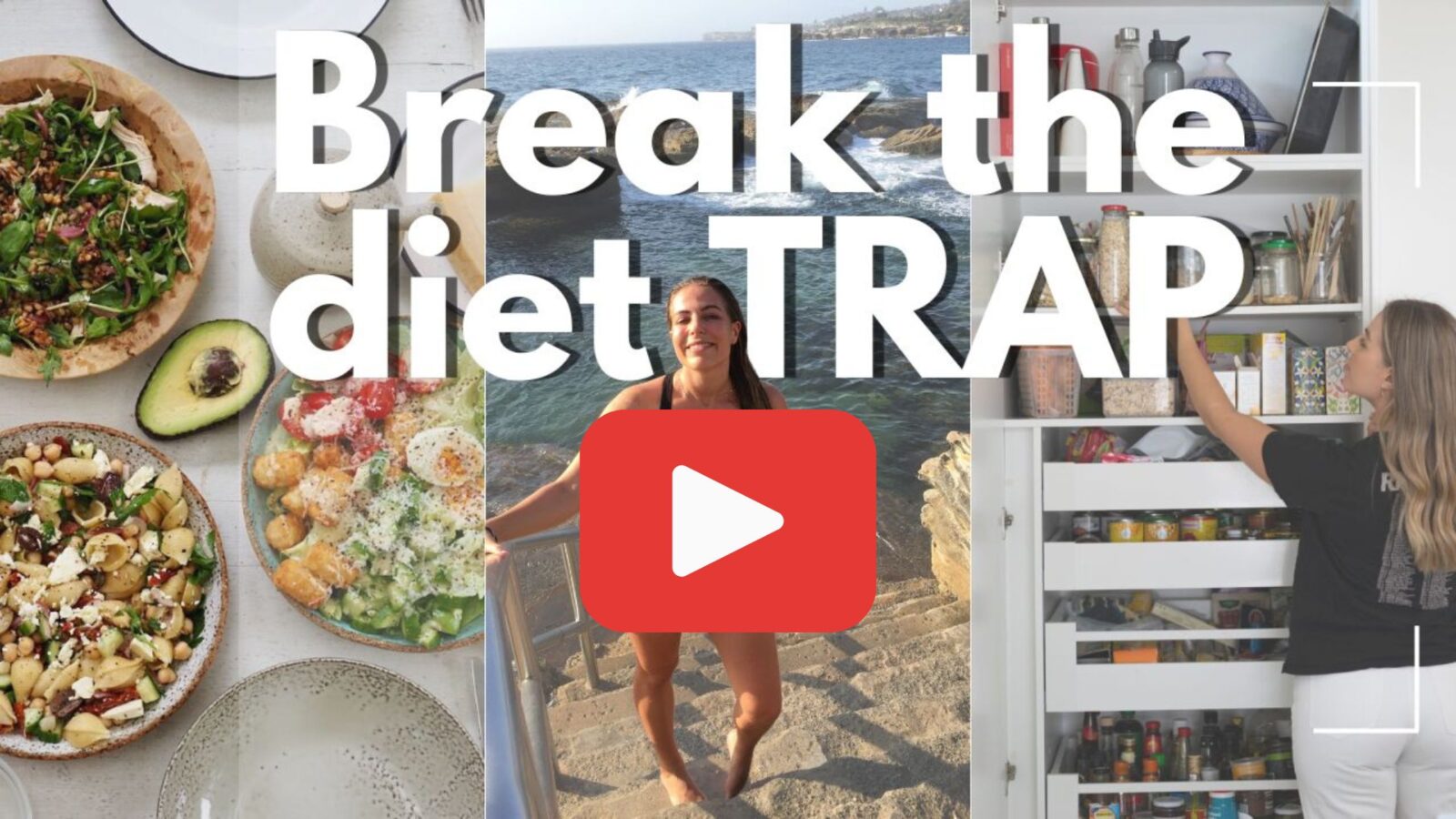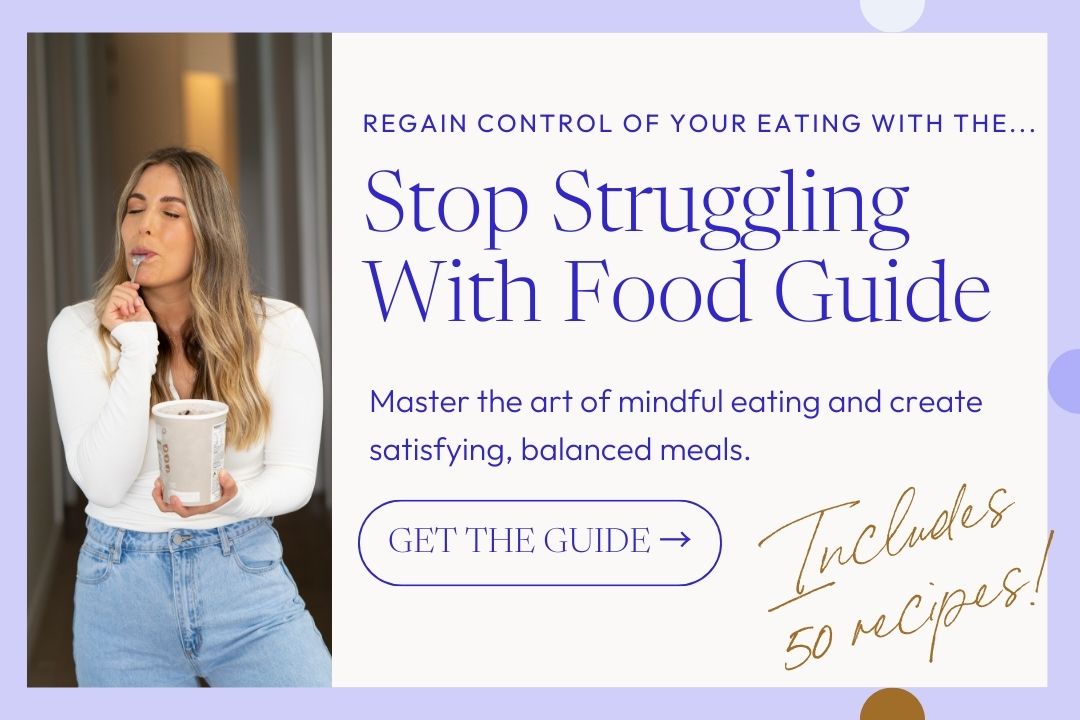If you’ve found yourself googling “Why can’t I stop eating cereal? Why can’t I stop eating bread? Why can’t I stop eating peanut butter? ” – You’ve come to the right place.
Do you spend all day eating well, but comfort eat when you get home?
Do you eat healthily during the week, but overeat on the weekend?
Guess what? There’s nothing wrong with your willpower or dieting strength.
If you believe foods like peanut butter or bread are ‘fattening’, you’re almost setting yourself up for a troublesome relationship with food.
It’s a common struggle
Truth is, it’s very common to have these relationships with foods like bread, cereal and peanut butter.
I used to have a thing with peanut butter where I couldn’t keep it in the house. Growing up, my mum kept a healthy household, but peanut butter was allowed because it’s healthy. I’d sneak teaspoons of it until 10-20 spoonfuls later, the jar was almost empty.
This out-of-control feeling is something you perhaps can relate to as well. So, let me start by saying; there is nothing wrong with you. You’re not addicted to these foods. But there’s a reason why you feel the way you do.
Good news is, you don’t have to feel this way forever.
Feeling obsessed and out of control
It’s this insane feeling of being completely out of control. You know you should stop, but it’s like you’re on autopilot. Sometimes, you even look forward to it as a reward after a hard day.
This can apply all foods, like cereal and bread. You start with one bowl, then another… and it’s often not until you feel physically sick or extremely full that you finally stop eating.
These binge foods are very common, and many people experience this.
Healthy foods and binge eating
Interestingly, binge foods aren’t always “junk” foods. They can be healthy foods like yoghurt, nuts, and bread (yes, bread IS healthy and carbs are not bad for you – incase you thought otherwise).
You might binge on these foods because they’re seen as healthy, but the thought process around them isn’t healthy. Eating ANYTHING in excess, paired with guilt and shame is what makes you feel out of control.
But why does this happen?
1. Restrictive dieting
A major reason for binge eating is restrictive dieting. When you don’t give yourself permission to eat certain foods, you’re more likely to binge on them. This can happen with both less healthy foods like cereal, chips and lollies – and healthier foods like peanut butter, carrots or cucumbers.
If you’re following strict portion controls or counting calories, you might binge on whatever’s available because your body craves energy and nutrients.
2. Carbohydrate connection
Carbohydrates are often demonised in diets, leading to a restriction of bread, cereal, pasta.. you know, all the things we often enjoy eating the most.
This restriction can make you crave these foods even more. You might start your day with good intentions of only having a low carb breakfast and a low calorie salad. But by the afternoon, you find yourself uncontrollably binging on carbs because you haven’t fully allowed yourself to eat them throughout the day.

3. The guilt trap
You know how sometimes when we eat something we really enjoy, but then feel guilty or ashamed about it afterward? Well, it turns out that feeling bad about eating can actually make binge eating worse.
When you restrict food, it can lead to intense cravings – often for the very food you’re trying to avoid. This sets you up to binge eat. Following a binge, you may feel guilty, or like you’ve failed. These feelings can make you more likely to then restrict again – setting you up for another binge.
So, how can you break this cycle?
1. Give yourself FULL permission
To break the cycle, you need to give yourself unconditional permission to eat all foods, including your binge foods. I know this might sound scary, but it really is the only way to feel more normal and in control around ALL foods.
This means incorporating these foods into your regular meals. For example, if you love Nutella, find ways to include it in your meals without feeling guilty. Order Nutella toast at a cafe or have it on bread at home as part of a balanced meal.

2. Eat Mindfully
Instead of eating straight from the jar or box, serve yourself a portion and sit down to enjoy it mindfully. This helps you feel more satisfied and less likely to binge.
For example, if you love peanut butter, have it on a slice of bread or in a bowl of porridge. Eat it until you’re satisfied, not just allowed a small portion.
3. Challenge your beliefs
Challenge the belief that certain foods are bad or should be restricted. Recognise that labelling foods as ‘good’ or ‘bad’ creates an unhealthy relationship with food. Understand that eating a variety of foods in satisfying amounts is part of a healthy diet.
This mindset shift is crucial for reducing binge eating.
4. Ignore the judgments
Eating intuitively can be hard when you feel judged by others. But it’s so important to prioritise your own comfort and health over others’ judgments. If necessary, communicate with those around you to reduce comments on your eating habits. Remember, you deserve to eat in a way that makes YOU feel good, regardless of others’ opinions.
The struggle with foods like peanut butter, cereal, and bread is common and often rooted in restrictive dieting and guilt. By giving yourself permission to eat these foods, eating mindfully, and addressing underlying beliefs, you can create a healthier relationship with food.
This isn’t about willpower; it’s about changing how you view and interact with food.
When your body trusts that you aren’t being deprived, you will stop emotional eating and no longer feel the need to binge on bread, cereal or peanut butter straight from the jar.
Believe me, it’s possible. Even for you.
Need more support? Binge Free Academy is an online course to help teach and support you to stop emotional eating with 30 engaging tutorials you can watch or listen to, live group coaching calls with me, and resources to turn new knowledge into action.
Check out Binge Free Academy to find out more.